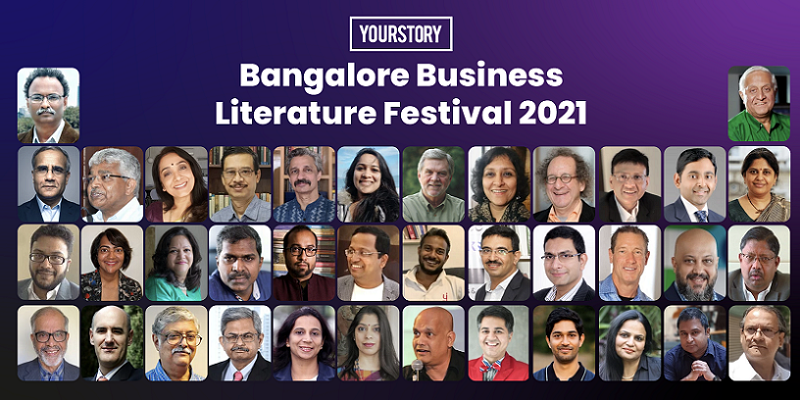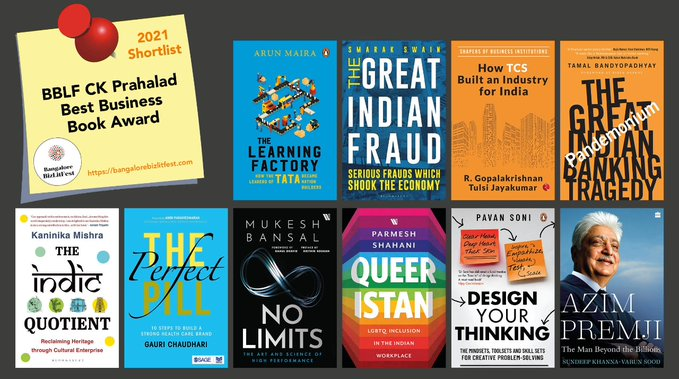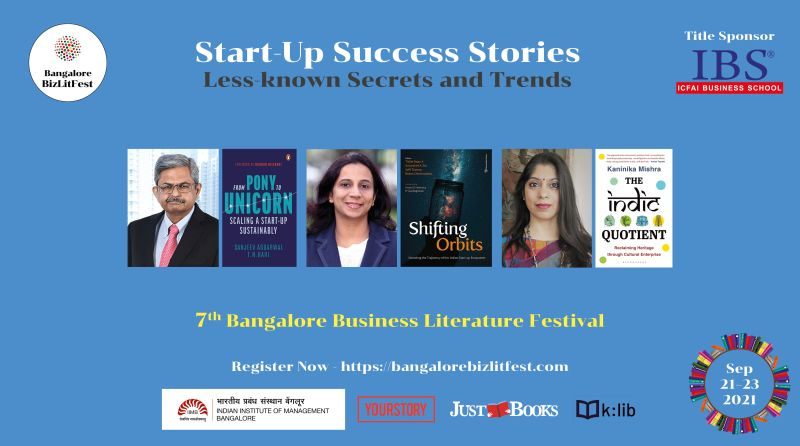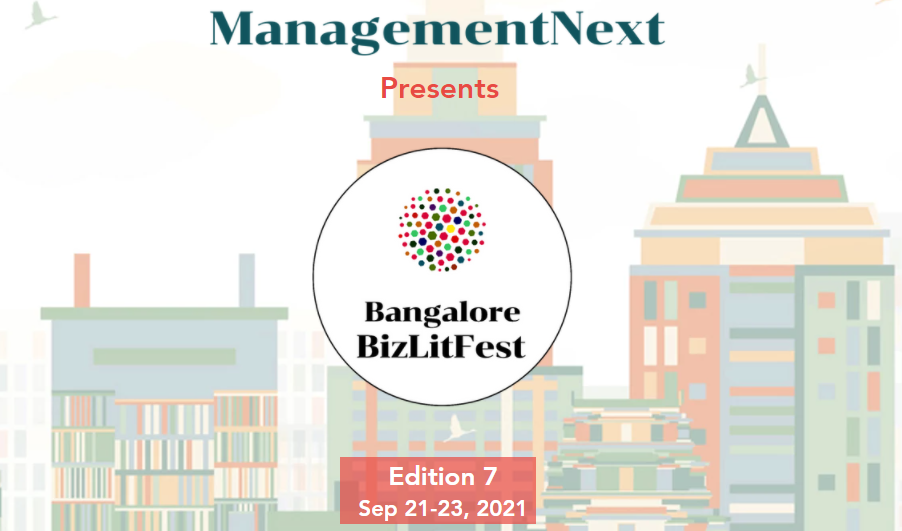The seventh annual Bangalore Business Literature Festival (BBLF) will be held entirely online this year, due to the coronavirus pandemic. As festival media partner, see YourStory’s coverage of the editions in 2020, 2019, 2018, 2017, 2016, and 2015.
See also YourStory’s Book Review section with reviews of over 320 titles, and our compilation of 85 Quotes on World Book Day.
BBLF 2021 will be held on September 21-23. Our earlier preview articles addressed startup advice and failure recovery. With the pandemic crisis raging for over 18 months in India, authors discuss eight aspects of resilience – from business shifts and digital transformation to cultural affirmation and crisis preparedness.
 1. Crisis preparedness
1. Crisis preparedness
“The best examples of business resilience have occurred in companies that had ‘vaccinated’ their enterprise with a vaccine called people power, or engagement along with culture and positivity,” explains R Gopalakrishnan, author of over 15 books on management, including A Biography of Innovations and Wisdom For Startups From Grown-ups.
“I call this vaccine PP-365 because it is the best vaccine to create long-life, sustainable enterprises,” he succinctly sums up.
A report by Deloitte Global reveals that companies with built-in resilience were better equipped to handle the crisis, according to Dr Karthik Nagendra, CEO of ThoughtStarters and author of The Thought Leader Way: Leading Your Business with Thought Leadership in an Altered World.
“I think companies that succeeded during the pandemic had some aspects in common. They already had invested in workforce initiatives like reskilling their employees or redesigning work,” he observes.
“They had diversified operations and developed technological capabilities to drive new business models. They had adapted to remote working, kept employees safe, and maintained trust between leaders and employees,” Karthik adds.
Such organisations valued diversity, equity, and inclusion and were committed to improving the environment and strengthening communities. “Thought leadership that focuses on research, collaboration between all stakeholders, and revolves on customer success will make a high impact in the present era,” Karthik advises.
 2. A return to traditional strengths
2. A return to traditional strengths
“The pandemic has impacted people all over the world. The way people live and work has changed, perhaps irreversibly,” observes Kaninika Mishra, author of The Indic Quotient: Reclaiming Heritage Through Cultural Enterprise.
“In India, the uncertainties and vulnerabilities caused by the pandemic saw people turn to familiar traditions to brace themselves physically and mentally,” she adds. Demand for turmeric as well as online yoga and meditation classes reportedly increased.
Kaninika notes that many small ventures showed more resilience and used imaginative ways to keep their business going than large organisations.
“I have seen yoga entrepreneurs with a 100 percent physical teaching model pivot to an online mode overnight,” she recalls. Another venture engaged in handloom products began producing masks within a week as the sale of non-essential products dropped to zero.
 3. Business transformation
3. Business transformation
“I have seen founders truly innovate and think out of the box, in the darkest of times. Resilience has been tested on the financial, technological, operational, and organisational fronts,” recalls Bhavna Dalal, Founder and CEO of Talent Power Partners, and author of Checkmate Office Politics.
Many quickly modified and transformed their business models. “It has been a survival of the fittest and the bravest. Of course, there was disappointment earlier but people recovered from it quickly and kept going,” she adds, citing as an example the founders of a coworking space who converted their offices into quarantine facilities.
ALSO READ

Why brand positioning is the way forward for D2C brands
4. Work from home
“Businesses, which used to insist on six-day week working have learnt the benefits of allowing people to work more flexibly, from homes. This is a significant shift in the mindset, which is poised to change the very labour market,” says V Raghunathan, BBLF Chair and author of bestsellers such as Games Indians Play and Ganesha on the Dashboard.
“The emerging model, in some ways, has been more women-friendly. It is more planet-friendly leading to lesser fuel emissions, and more labour market-friendly in creating newer labour markets especially in the food and grocery delivery markets,” he adds.
There have also been breakthroughs in the use of technology for delivering online education, and notable developments in healthcare. “Of course, many of these come with their flip side, especially when you consider the problems of children being out of schools for nearly two years, or technical education without laboratory work,” Raghunathan cautions.
 5. Brand power
5. Brand power
Shifts in business and marketing practices are cited by Jessie Paul, CEO of B2B consulting firm, Paul Writer and author of No-Money Marketing: From Upstart to Big Brand on a Frugal Budget.
For example, Bajaj Consumer Care launched a whole new product category – hand sanitiser – in the midst of the lockdown, as that was the market need. “They also ramped up their digital presence across product lines as the ‘place of purchase’ had changed,” she explains.
Some brands had to change their delivery models from in-person to remote. “Those that had already embarked on digital transformation were poised for success,” Jesse adds.
“In some product categories where the rules restricted business, resilience was in staying in the minds of consumers, managing the employee branding to the extent possible, and finding unaffected niches to keep revenues flowing,” she observes.
She advises businesses to carefully understand whether their customer has changed due to the ongoing crisis. Frameworks such as the ‘4 Ps’ (product, price, place, promotion) can help lay out the scenario.

ALSO READ

Why did this IIT Bombay alum decide to start in the yoga and wellness space with the Eka app
6. Digital transformation
“Each and every company out there which has survived was smart enough to adapt. Many firms embraced D2C, online deliveries, and even WFH,” explains Suresh Narasimha, tech entrepreneur, Co-founder at CoCreate Ventures, and owner of JustBooks.
“I am specifically proud of how one of our companies Cultureplace adapted to the pandemic and started delivering curated learning experiences,” he adds. Instead of only cultural events in physical spaces, it also offers online storytelling, workshops, and interactive sessions on music, math, and science.
“The pandemic was a boon to digital-first brands that were ready to grab the opportunity whether it was coffee or entertainment,” Jesse Paul affirms.
Now digital transformation is the buzzword. “But it will not be sufficient to give a competitive edge, only ensure survival. Brands playing catch-up need to look beyond digital transformation delivering operational efficiency, to delivering access to whole new market segments,” she emphasises.
ALSO READ

How can Indian MSMEs compete in the post-COVID-19 world?
7. Media shifts
Some publishers pivoted smartly during the pandemic, according to Rishad Tobaccowala, Senior Advisor to the Publicis Groupe and author of Restoring the Soul of Business: Staying Human in the Age of Data.
“My publisher HarperCollins quickly pivoted to using Glose to distribute the book globally and virtually. Their virtual events were another form of resilience,” he explains. “My book seems to have anticipated key challenges and opportunities we face, making people think I wrote it post-COVID when it was actually written in 2019,” he adds.
 8. The festival industry
8. The festival industry
Pandemic challenges have affected book fairs and cultural festivals as well. BBLF had to switch to an online format for the first time in 2020, and will be virtual this year as well.
“Since there is fatigue today about virtual events, the challenge is how to get people interested in an online business literature festival. So we picked topics that are current, hot, and edgy,” explains Benedict Paramanand, Co-founder of BBLF.
He cites workplace transformation and the rise of literature tech platforms as other examples of resilience and growth. Other topics to be discussed at the three-day festival next week include Indian business writing, political shifts, and the future of Indian science.
Edited by Teja Lele Desai
Read more: yourstory.com